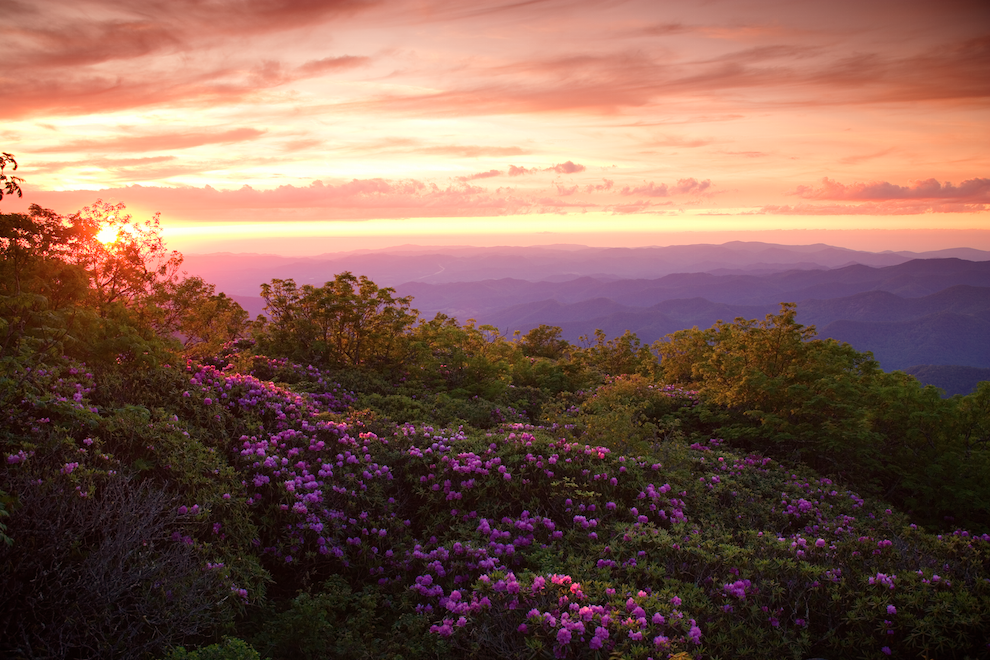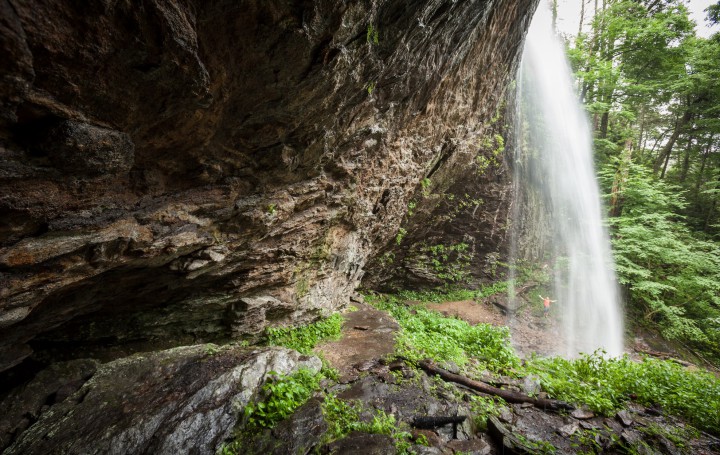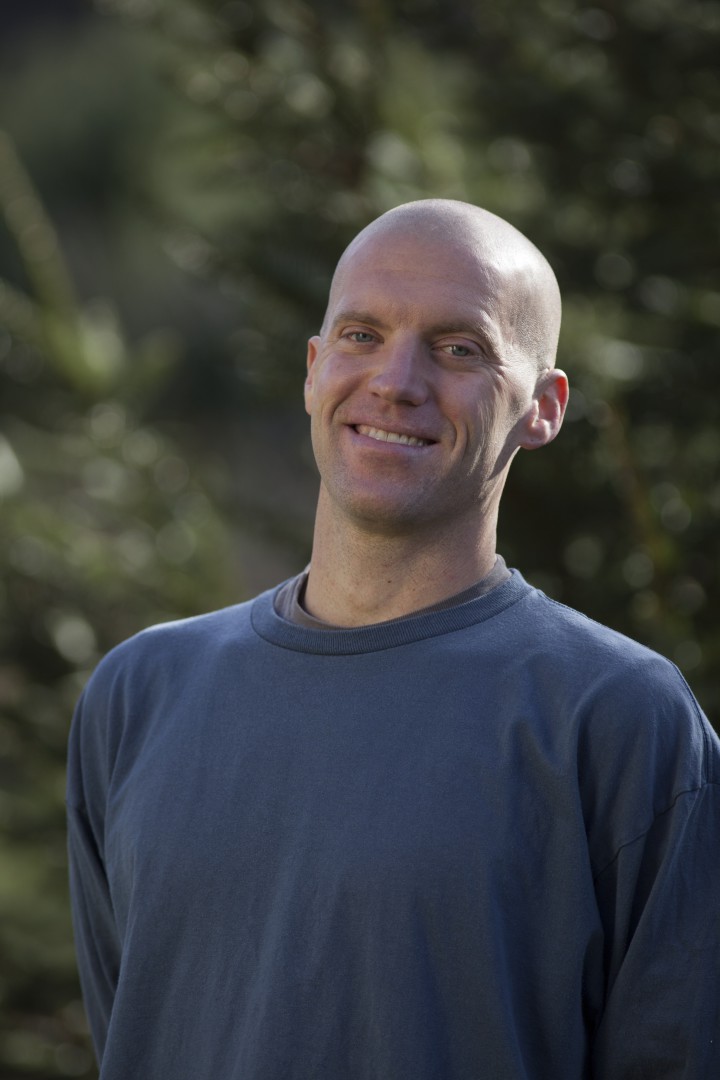BY WILL HARLAN
You already know that Buncombe County is the most populous and developed county in Western North Carolina. But you probably didn’t know that it’s also home to one of the largest old-growth forests in the East.
Big Ivy — a section of the Pisgah National Forest in the northeast corner of Buncombe County near Barnardsville — is one of the wildest spots in Appalachia. It’s home to over 40 rare and endangered species and is one of the country’s most biologically diverse forests. And it’s only a 30-minute drive from downtown Asheville.
Even if you haven’t visited Big Ivy, you’ve probably seen it: It’s the most photographed spot on the Blue Ridge Parkway. The vistas from Craggy Gardens span the unscarred, unbroken forests of Big Ivy.
Big Ivy protects the headwaters of the Ivy River, a primary tributary of the French Broad and the drinking water supply for the town of Weaverville. It’s also one of the most popular recreation areas in Western North Carolina — an outdoor oasis for hiking, mountain biking, hunting, fly fishing, climbing, trail running and horseback riding.
Hollywood blockbusters have been filmed in Big Ivy, including The Hunger Games and The Last of the Mohicans. Dozens of cascades — including 70-foot Douglas Falls — thunder down its rugged slopes. Big Ivy’s beauty and recreational opportunities have also attracted ecotourism, agritourism and jobs: Navitat Canopy Tours has helped revitalize the local Barnardsville economy, and local Dillingham Family Farm and Ivy Creek Family Farm are highlights of farm tours and tailgate markets. Colleges and universities across the region bring students to Big Ivy for education and research in its living laboratories of old-growth forests.
Unfortunately, the big trees of Big Ivy could be in big trouble.
The U.S. Forest Service is rewriting its management plan for the entire Pisgah-Nantahala National Forest. This plan will govern how the forest is managed for the next two decades. In a draft released this summer, over 70 percent of Big Ivy would remain open to logging. Appalachian District Ranger Matt McCombs says there are no current plans for logging. But that could change once the forest plan is finalized next year.
This is not the first time that Big Ivy has been threatened by logging. In the 1980s and 1990s, the Forest Service planned substantial commercial logging projects for Big Ivy. But the local community rallied together, organized a grassroots campaign and halted the projects.
Yet, for the past 20 years, Big Ivy has remained largely unprotected. The latest draft of the Forest Plan could leave Big Ivy even more vulnerable to logging. So Big Ivy supporters have been mobilizing once more — and encouraging local leaders to help them.
Two weeks ago, the Buncombe County Board of Commissioners voted unanimously to support permanent protection against logging in Big Ivy. Instead of leaving over 70 percent of the forest open to logging, the Buncombe County resolution supports protecting 7,900 acres of the forest as wilderness, especially its old-growth forests, rare species habitat, scenic vistas and pristine headwaters.
The wilderness recommendation does not affect any current uses of Big Ivy. Mountain biking, horseback riding, hunting and fishing will all continue to be allowed. All mountain bike trails are outside of the recommended wilderness area. No roads or hiking trails will be closed to anyone. The wilderness recommendation simply prohibits logging and development in trail-less, high-elevation areas of Big Ivy where most of the old-growth forests are located.
A Big Ivy wilderness designation has strong public support. This past February, over 300 people packed the Big Ivy Community Center (and at least 100 more were locked out of the meeting due to fire code restrictions) to oppose potential logging in Big Ivy.
And at the recent commissioners’ meeting, nearly 200 Big Ivy supporters flooded the chambers and overflowed into adjacent rooms. The public comment period lasted for nearly two hours. Not a single person spoke against wilderness.
There were plenty of hippies, environmentalists and outdoor enthusiasts speaking in support of a Big Ivy wilderness. But they were joined by some of the region’s most respected biologists — including North Carolina Asheville professor and Smithsonian botanist David Clarke; Warren Wilson College biologists J.J. Apodaca and Liesl Erb; renowned old-growth expert Josh Kelly; and Mars Hill College’s Alan Smith, who has spent 39 years conducting field research in Big Ivy.
Big Ivy’s old-growth forests are cherished by Republicans and Democrats, old and young, horseback riders and mountain bikers, longtime local families and new transplants. Irene Richards Dillingham — an 82-year-old fourth-generation Barnardsville resident — spoke in favor of protecting the forests where she played as a child. Barnardsville resident Natalie Bogwalker, nine months pregnant, expressed hope that her child will walk beneath Big Ivy’s towering trees.
There are places in Western North Carolina where logging may be appropriate. But Big Ivy is not one of those places. Big Ivy is far more valuable as an intact forest, a cornerstone of recreation, tourism and biodiversity in Western North Carolina.
The commissioners’ resolution was a monumental first step. Now it’s up to the Forest Service to include an expanded wilderness recommendation for Big Ivy in its upcoming forest plan. A Big Ivy wilderness has strong scientific support, unanimous political backing from county leaders and overwhelming public approval, as expressed in the two public meetings for protection of the area.
A wilderness designation for Big Ivy would be an amazing asset to Buncombe County and the entire region. It would permanently protect one of the last and most ancient forests in the East.
Let’s keep Big Ivy just the way it is — wild, scenic, adventurous and uncut.
Voice your support for an expanded Big Ivy wilderness in the upcoming Forest Plan by sending comments to NCPlanRevision@fs.fed.us. More information and sample letters can be found at friendsofbigivy.org or on Facebook: Friends of Big Ivy.
Will Harlan is a Barnardsville resident and a Friends of Big Ivy organizer.






Before you comment
The comments section is here to provide a platform for civil dialogue on the issues we face together as a local community. Xpress is committed to offering this platform for all voices, but when the tone of the discussion gets nasty or strays off topic, we believe many people choose not to participate. Xpress editors are determined to moderate comments to ensure a constructive interchange is maintained. All comments judged not to be in keeping with the spirit of civil discourse will be removed and repeat violators will be banned. See here for our terms of service. Thank you for being part of this effort to promote respectful discussion.